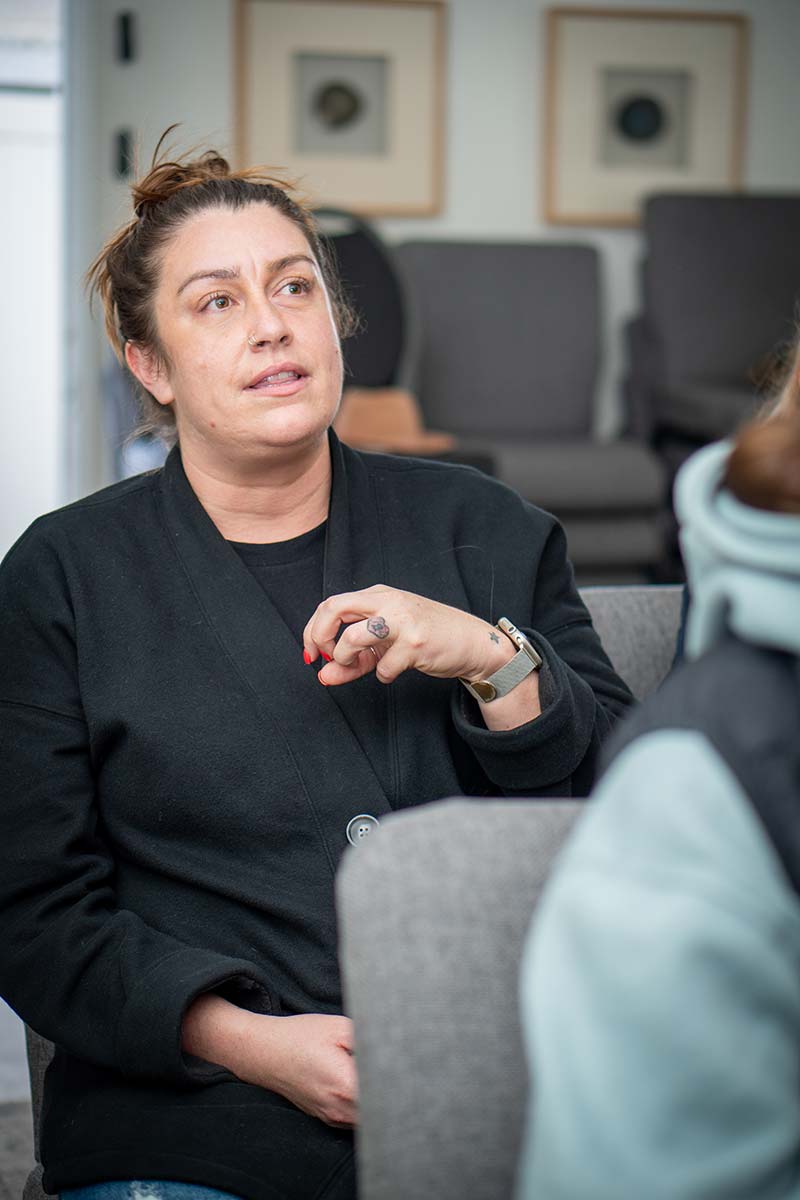Gender-specific treatment is designed to create an effective and understanding environment for the woman and her addiction. This treatment is designed specifically for treating men and women separately.
The point of these programs is to address the unique needs of each individual. The treatment is designed to create sensitivity and make women feel comfortable and supportive in a foreign environment.
Through gender, substance abuse differs in choice of substance, rate of dependence, and how one responds to a drug.
There are fundamental differences in all men and women, such as their physical biology, or even their culture. Just these two fundamental differences can contribute to the various issues men and women experience in substance abuse.
Turning to Drugs and Alcohol
The typical experiences related to substance abuse include traumatic events and abusive relationships brought on by overprotective partners. Women turn to self-prescribed drugs to self-medicate and escape from the painful emotions brought on by abuse or victimization.
Women and their addiction can unknowingly be caused by those closest to them. It’s proven that anxiety and psychological stresses can be a triggering factor in women and their addiction habits.

Several reasons women choose to abuse substances:
- Depression
- The thought of being in control
- Peer and social pressure
- Financial and family demands
- Career and school pressures
- End of a relationship
- Death
- Abuse brought on by overprotective partners
- Prescribed Medication
- Self-Medicating
A study by the National Institutes of Health finds that over-medication by doctors has contributed to the spike in addiction among women. Furthermore, family history plays a huge role in substance abuse, and a partner may contribute to the downfall of the addict.
A commonly known fact about women includes their struggle to fit in with a male-dominated society. To a man, women are thought of as easily influential and controllable. This way, it seems they are easily convinced to start an addiction.
Benefits (and Warnings) to Gender-Specific Treatment
There are many benefits to Gender-Specific Programs, listed below are just a few:
- An encouraging sense of trust between same-sex individuals
- Specialized treatment for physiological, emotional and relational issues
- Minimized distractions between male and female clients in a therapy session
- Supportive gender-sensitive groups to inspire open communication
During therapy, it’s important to keep men and women separated as they can communicate in groups designed for them. Women find it easier to discuss topics within a female-only group as they have more freedom to open up about abuse or relationship issues. It’s also a time women can focus on themselves and not feel the need to please any other’s desires; it’s often seen that a woman will put the needs of others ahead of their own. However, this may not be the case when a woman is far too invested in her addiction rather than family.
While it may be beneficial to discuss in a group, hostility can still exist. Women and their addiction may cause self-perceiving issues where some will see others as a threat to their relationships. Other women may feel their addiction is a competition and impose negative feelings on others trying to recover.
According to the American Journal of Drug and Alcohol Abuse, women feel that trust and warmth are the most important qualities in their therapeutic relationships. On the opposite side of the spectrum, men feel that a utilitarian problem-solving approach is best.
Women and Addiction
Women addiction treatment is most successful when designed around trust and warmth. When faced with this welcoming nature, women tend to open up more. They may be more willing to share their addiction troubles, especially those related to childbirth, infertility or hormones. They can also discuss the details of motherhood or workplace dynamics without the distraction of a male audience. This is why it is best to keep women addiction treatment separate from men’s addiction treatment.
Supportive therapy sessions can encourage bonding between women and inspire open communication about women’s social and cultural pressures.
Through gender-specific treatment, women are able to:
- Empower one another
- Build support systems
- Build life skills
- Create a new meaning
Although women and addiction are more prevalent in treatment therapy, it’s known that women face more adversity during the treatment. For one, a woman may be pregnant while in treatment therapy and fear the social/legal actions that could be taken against her. Women may also fear that there will be no childcare for their children while enrolling in treatment sessions.
Furthermore, while men are more likely to become drug dependent, women escalate in their addiction faster. Women also increase their consumption rate faster than men and have a harder time quitting and more often end up relapsing.
Why Do Women Keep Using?
Fear of Weight Gain
Women are afraid to stop the use of nicotine because of weight gain and the hard-known fact about quitting while on your menstruation cycle. Nicotine affects the hormonal balance of a woman’s body, and nicotine patches do not work as well for women. Also, vaping is not an alternate route to smoking cigarettes.
Easy to Become Inebriated
Women continue the use of alcohol because of the easy ability to get wasted. This is more easily accomplished by women than men because women have lower level enzymes. These enzymes — alcohol dehydrogenase and aldehyde dehydrogenase — break alcohol down in the stomach and liver. Women also weigh less than men, which results in them getting drunk faster.
Quick Pain Relief
Women are more likely to become dependent on opioids as they are more likely to suffer from chronic pain conditions, such as fibromyalgia. These conditions allow women to be prescribed Opioids or other forms of prescription pills, oftentimes more than men.
The popular choice among women happens to be prescription drugs over marijuana or alcohol. While opioids are quickly becoming the first choice, more women are using marijuana during pregnancy than in past years. Using marijuana while pregnant can result in smaller babies.
Using a substance while pregnant can harm the health of the mother and her baby. The condition known as Neonatal Abstinence Syndrome is popular among newborn babies due to the misuse of opioids among mothers.
Fear of Legal Action
In treatment, women fear that getting help for their substance abuse problem during or after pregnancy will result in legal actions. Women fear legal actions as they often have many commitments outside of therapy that would make it more difficult.
They also fear that child care will not be provided while enrolling in treatment, and their commitment could be compromised. These are all fair thoughts, and the reason for women’s addiction treatment is to put these scenarios at ease.
Women addiction treatment works to battle the three recurring tendencies listed above. Even after women enter treatment, they are still more likely to experience co-dependencies, mood swings, anxiety, and psychological distresses from the drugs and alcohol than men.
Overcoming Addiction
Treatment is daunting, but when a friend can provide support, the client finds they can more easily overcome their substance abuse addiction. Learning to be codependent on a family member or friend can provide major support for the abuser. The support is felt throughout the recovery process and after the release from treatment. Furthermore, the addict feels a more positive effect on their treatment when family and friends refrain from using drugs or alcohol. By abstaining from substance abuse together, the journey to recovery seems far more attainable.

However, sometimes being codependent on a family member or friend can be debilitating. A family member or friend could become a distraction or hinder the recovery process. The recovery process is a time to focus on self-growth, health, and improvement.
Women addiction treatment can also help control the number of mood swings a woman faces while undergoing addiction treatment therapy. Mood swings are common in women with high levels of substance abuse as chemicals attack the brain. When the abused substance wears off, such as alcohol, a physiological reaction is created in the nervous system. This can result in depression or anxiety.
Furthermore, women can experience anxiety disorders, or psychological distresses throughout addiction treatment. This can be a result of gender-based roles or something else. According to the WHO, women in society will experience gender-based violence, socioeconomic disadvantages, low income, and income inequality. It’s also widely known that women share continuous responsibility for the care of others.
In short, women are triggered by negative life experiences and events.
Family and Addiction Recovery
The withdrawal period for a woman can be more intense than for a man. They are also more likely to overdose than a man. For this reason, the detoxification period in women addiction treatment is important. Detoxification deals with removing toxic substances from the bloodstream. This period is important as it can be the defining factor in deciding if one moves forward with treatment or relapses.
The process of detoxification is complex and may require one to check-in with a facility. For example, if a pregnant woman attempts to stop using drugs and alcohol without medical help suddenly, she can put her fetus at risk; this is far more dangerous than a woman who is not pregnant and attempting to quit. While the process of detoxification is usually quite short, the road to recovery and sobriety is lengthy.
Families play an important role in the treatment and recovery process. This role is important as women in treatment often need support. Families help with this as they lift the burdens of work, home care, child care, and other family responsibilities from the woman while in treatment. Enrolling in a women addiction treatment program can greatly assist women during the time of abstinence.
In women addiction treatment and outside of treatment, women often relapse because of:
- Becoming depressed
- Living apart from their children
- Experiencing the effect of a stressful marriage
- Unrealistic expectations during the recovery process
If your loved one is experiencing any of these recurring tendencies, contact us at New Directions for Women today.
References:
https://www.ncbi.nlm.nih.gov/books/NBK83257/
https://www.who.int/mental_health/prevention/genderwomen/en/
https://www.ncbi.nlm.nih.gov/pmc/articles/PMC2235192/
https://www.health.harvard.edu/press_releases/women-face-tough-challenges-in-overcoming-addiction










